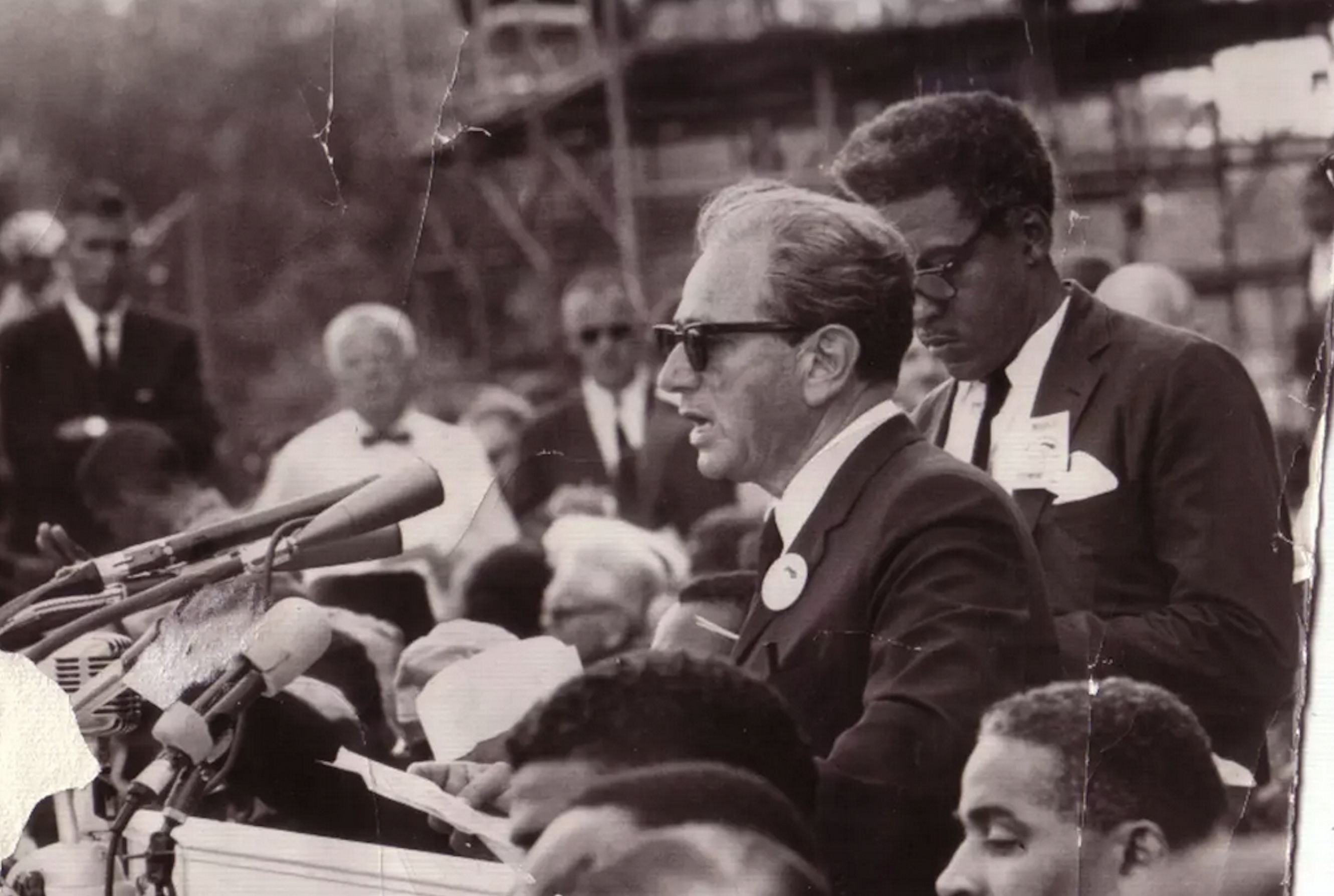By Lynn Burnett
Few people know that an anti-Nazi dissident, who was expelled from Germany by the Gestapo, spoke right before Martin Luther King at the March on Washington… and that King’s own mentor, Bayard Rustin, considered it one of the most powerful moments of the day. This is the story of a Nazi-fighting rabbi who stood in solidarity with the civil rights movement: Joachim Prinz.
Born in Germany in 1902, Joachim Prinz served as a rabbi for the Berlin Jewish community. In the 1930s, he travelled extensively throughout Germany speaking against Nazism, and was arrested numerous times by the Gestapo. As Nazism grew in strength, he feared the worst, and urged German Jews to migrate en masse to Palestine. When he was expelled from Germany in 1937, Jewish leaders in the U.S. invited to him to resettle. Joachim soon became the rabbi of a historical synagogue in Newark, New Jersey: the Temple B’nai Abraham. From this position, Joachim continued to mobilize against Nazism in his homeland… and later, to support Jews in the wake of the Holocaust.
Joachim Prinz was troubled by the racial dynamics he witnessed in the United States. Shortly after his arrival, he began criticizing American Jewish communities for being indifferent to the plight of segregated Black communities. His message was a forceful one: Jews who had fled the terror of Nazism, and who knew firsthand the poverty and stigma of the segregated ghetto, could not look at racial segregation in the U.S. without being reminded of their own lives under Nazism. American Jews, the rabbi argued, had a responsibility to fight White supremacy in all its forms.
Joachim Prinz was soon protesting segregated housing, schooling, economic inequality, and other forms of racial injustice. He was the first rabbi to reach out to Martin Luther King in the early civil rights years, and invited King to speak at his synagogue… as well as to be a keynote speaker for a gathering of Jews in the South, which was the first time King ever spoke to a primarily White audience in that region.
As the president of the American Jewish Congress from 1958–1966, Joachim was in a major leadership position for much of the civil rights era. In 1963, he represented the Jewish community as an organizer of the March on Washington. The Nazi-fighting rabbi spoke just before Martin Luther King on that momentous day. Just minutes before some of the most famous words in American history were spoken by King, Joachim Prinz urged the country to act with these words: “When I was a rabbi of the Jewish community in Berlin under the Hitler regime, I learned many things. The most important thing that I’ve learned in my life, and under those tragic circumstances, is that bigotry and hatred are not the most urgent problems. The most urgent, the most disgraceful, the most shameful, and the most tragic problem is… SILENCE!”
During the Black Power era, many White American Jews became less supportive of the struggle for Black civil rights. Joachim Prinz, however, found that his experiences under Hitler’s regime helped him relate to this new phase in the Black Freedom Movement. In Nazi Germany, the sense of powerlessness could be crippling for Jews. Lifting up a Jewish version of “Black is Beautiful” had been essential for maintaining a sense of self-love, and a Jewish version of “Black Power” had been an important antidote to pushing back on the wide range of ways that Jews were made to be, and feel, powerless. The Black Power era, however, saw an increasing amount of anti-Semitism in the Black Freedom Movement that troubled Joachim.
By the late 1960s, many of the Jews in Joachim Prinz’s synagogue were more fully assimilating into Whiteness, participating in White flight, and distancing themselves from the Black Freedom Struggle. Joachim not only believed this was wrong: he worried about the ugly power of anti-Semitism to rear its head again and again throughout history – regardless of the advances that Jews made – and did not believe that Jews could find true safety by assimilating into Whiteness. They needed to build a strong, multiracial democracy, based on multiracial unity and common cause. It was a cause he continued to fight for throughout the remainder of his life.
Additional Resources
Documentary: I Shall Not Be Silent.
Autobiography: Joachim Prinz, Rebellious Rabbi: An Autobiography—the German and Early American Years.
Children’s Book: Audrey Ades & Chiara Fedele, The Rabbi and the Reverend: Joachim Prinz, Martin Luther King Jr., and Their Fight against Silence.
Articles:
Rachel Eskin Fisher, Rachel Nierenberg Pasternak, & Clement Price: Rabbi Joachim Prinz: The Jewish Leader Who Bridged Two Journeys, From Slavery to Freedom.
Glenn Fowler: Joachim Prinz, Leader in Protests For Civil-Rights Causes, Dies at 86.
JoachimPrinz.com: Biography.
Wikipedia entry.
